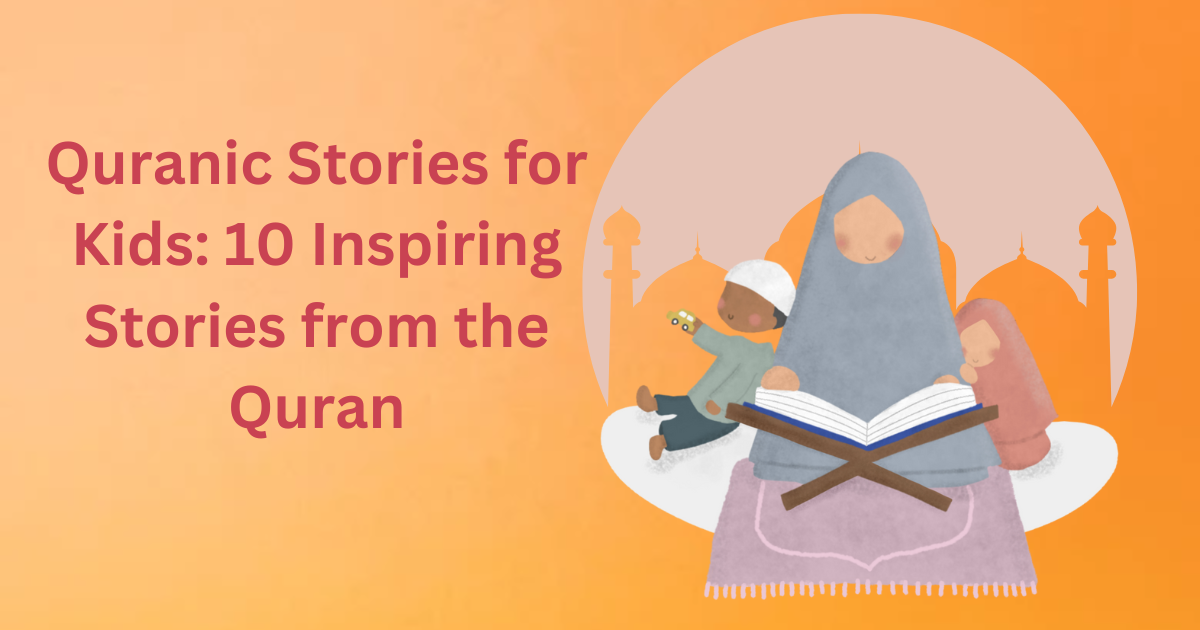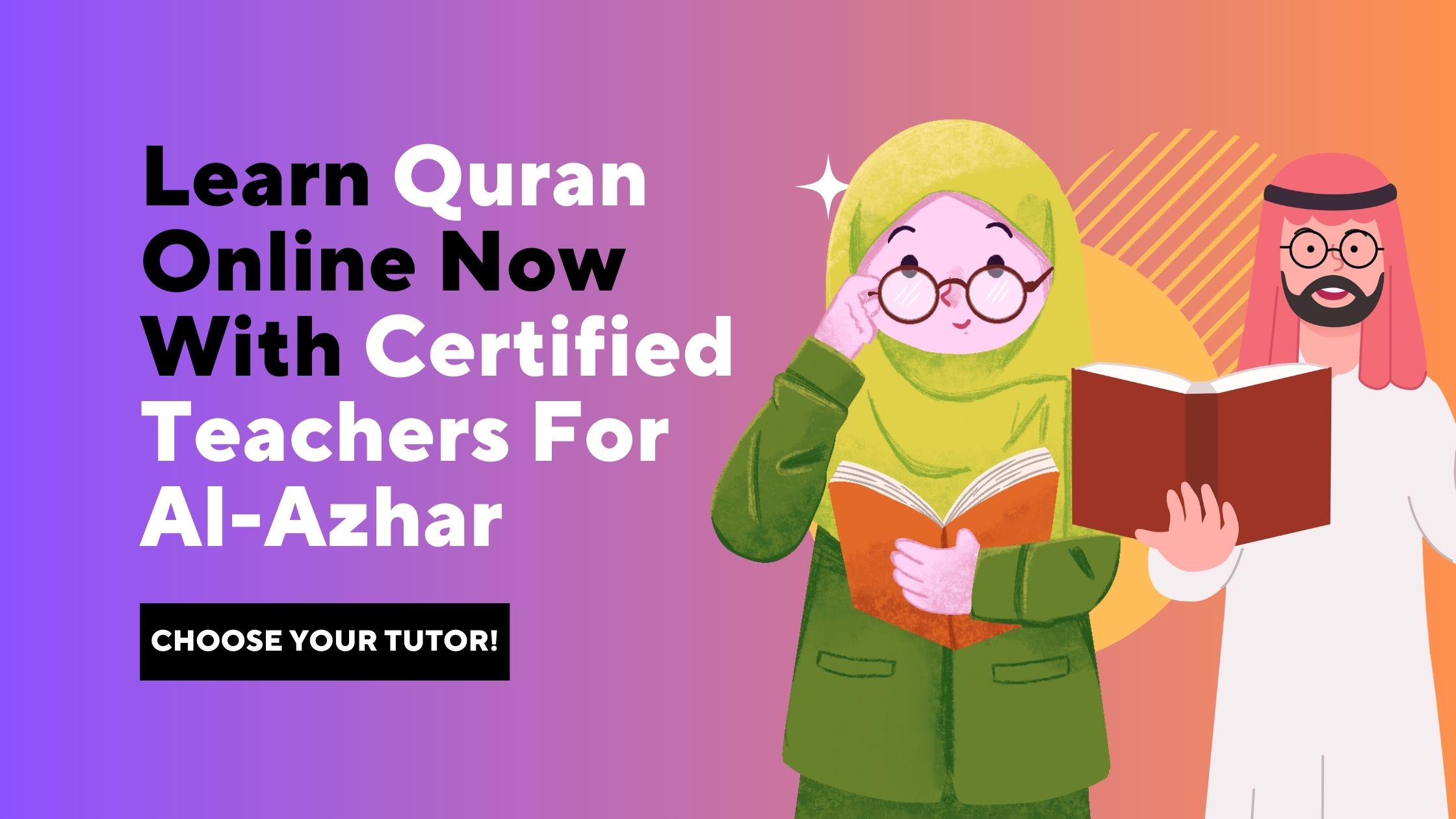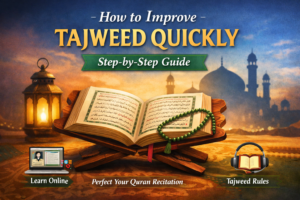The Quranic stories for kids serve as powerful tools for teaching children essential moral and spiritual lessons. They are not merely tales from the past but divine narratives that shape hearts, guide actions, and instill values.
By presenting the lives of previous messengers and the trials of past nations, these stories connect young minds to the timeless principles of faith, perseverance, and obedience to Allah. Whether it’s the steadfastness of Prophet Nuh, the bravery of Prophet Ibrahim, or the wisdom of Prophet Sulayman, each story holds valuable lessons that resonate with children.
By simplifying and adapting these narratives, we can inspire our children to embody these virtues in their own lives, nurturing a deep and lasting connection with their faith.
Table of Contents
What Is the Meaning of the Story in the Quran for kids?
The story in the Quran refers to when Allah tells about the past nations, previous messengers, and events that happened during those times. Those stories are characterized by strong influence in reforming hearts, deeds, and morals. We must simplify them and redefine their events to suit our kids and impact them in the desired manners.
What Is the Importance of Stories in the Quran?
The importance of the stories in the Quran are evident in the nature of the Quran itself; it is the word of Allah, and every word is significant, and every Ayah or fragment of story holds imminent importance and significance. The importance of these stories include the following:
1. Know about the previous messengers and books:
The stories in the Quran are not imaginary. We believe in all the details that are mentioned in the Quran. Allah says in Surah Al Nisa:
“And those who believe and do good, We will soon admit them into Gardens under which rivers flow, to stay there forever and ever. Allah’s promise is ˹always˺ true. And whose word is more truthful than Allah’s?”
وَٱلَّذِينَ ءَامَنُوا۟ وَعَمِلُوا۟ ٱلصَّـٰلِحَـٰتِ سَنُدْخِلُهُمْ جَنَّـٰتٍۢ تَجْرِى مِن تَحْتِهَا ٱلْأَنْهَـٰرُ خَـٰلِدِينَ فِيهَآ أَبَدًۭا ۖ وَعْدَ ٱللَّهِ حَقًّۭا ۚ وَمَنْ أَصْدَقُ مِنَ ٱللَّهِ قِيلًۭا ١٢٢
Believing in the Quran is one aspect of the Pillars of Faith as mentioned in the well-known Hadith. We can’t believe in something we don’t know; so we should learn the most intricate details of these stories and forge our belief in them, word by word.
2. Explain Allah’s traditions in his creation “Sunnatullah”:
Allah puts many laws in his creation that reflect His divine wisdom and order. We know them through the stories mentioned in the Quran. Learning these stories by heart helps us remember and understand these laws. For example: The struggle between right and wrong that we notice between the messengers and the Infidels and polytheists.
3. Show Allah’s signs and miracles to His creation to support His messengers:
We know without a doubt that Allah sent many messengers and their main word was about Monotheism. Allah provides many evidences for His messengers. When we know these signs and see how the argument between messengers and their nations, we realize that Allah’s truth always prevails ultimately.
4. Use A Narrative style that is easy and understandable:
We know the great impact of stories; they can explain complex facts easily and usually include many morals. You can reflect on the morals of these stories in your life and apply what you learned from them easily.
5. Showcase how the advice and sermons of the prophets are specific to each nation according to their situation:
Although all prophets focused on monotheism, they also focused on the problems that their nation was facing, addressing specific social, ethical, and moral issues. You can see the advice and sermons of the prophets and benefit from their guidance.
What Are Some Interesting Stories for Kids in the Quran?
The Quran mentions many stories such as messengers’ stories and parables’ stories ( “amthal” in Arabic) are used to illustrate moral and spiritual lessons through symbolic stories.
a) Messengers’ stories
The Quran mentioned many stories of Allah’s messengers in many surahs. Allah mentions approximately 25 prophets in the Quran. Some Prophets’ stories are Mentioned in detail, and others are mentioned Briefly or in Passing.
1. The Story of Prophet Adam:
Prophet Adam (peace be upon him) is the father of mankind. Allah created Adam and then told the angels to bow down to him. They all did except Iblis” satan”. Iblis was too proud to bow; so Allah banished him from Heaven as a punishment for his arrogance and egotistic pride.
Later, Iblis tempted Adam and Hawaa to eat from a tree that Allah has instructed him to not eat from it.Iblis envied Adam. As a result, Adam and Hawaa were sent down to Earth to live the rest of their lives and prove their worth of returning to Heaven in the Afterlife.
Asked Allah to forgive him he said as mentioned in the Quran:
“رَبَّنَا ظَلَمْنَا أَنفُسَنَا وَإِن لَّمْ تَغْفِرْ لَنَا وَتَرْحَمْنَا لَنَكُونَنَّ مِنَ الْخَاسِرِينَ”
“Our Lord! We have wronged ourselves. If You forgive us not and bestow not upon us Your mercy, we shall certainly be of the losers.”
The story is full of moral and Islamic values which makes it crucial for kids. Through this story, you can teach your kids to be humble, and guide them through understanding the purpose of our life; to obey Allah and construct Earth.
2. The Story of Prophet Nuh (Noah):
Prophet Nuh (peace be upon him) is known for his steadfastness in calling his people to worship Allah. He stands for 950 years although his people do not respond. Nuh (peace be upon him) complained about them to Allah, and Allah told him to build a huge ship. A great flood was sent to his people and Allah ordered him to take the believers and a pair of every kind of animal and sail through the flood to safety.
Allah says in surah Al Qamar.
فَدَعَا رَبَّهُۥٓ أَنِّى مَغْلُوبٌۭ فَٱنتَصِرْ ١٠ فَفَتَحْنَآ أَبْوَٰبَ ٱلسَّمَآءِ بِمَآءٍۢ مُّنْهَمِرٍۢ ١١ وَفَجَّرْنَا ٱلْأَرْضَ عُيُونًۭا فَٱلْتَقَى ٱلْمَآءُ عَلَىٰٓ أَمْرٍۢ قَدْ قُدِرَ ١٢ وَحَمَلْنَـٰهُ عَلَىٰ ذَاتِ أَلْوَٰحٍۢ وَدُسُرٍۢ ١٣ تَجْرِى بِأَعْيُنِنَا جَزَآءًۭ لِّمَن كَانَ كُفِرَ ١٤
Long) before them the nation of Noah belied. They belied Our worshiper saying: ‘Mad! ‘ and he was reprimanded. (9) Then he supplicated to his Lord, (saying): ‘I am overcome, help me! ‘ (10) We opened the Gates of Heaven with torrential water (11) and caused the earth to gush with springs so that the waters met for a predestined matter. (12) We carried him in a well-built, watertight vessel made from planks (of wood) (13) that ran on under Our Eyes, a recompense for him because he had been disbelieved. (14)
We learn that Nuh (peace be upon him) was very patient with his people, and that disobedience against Allah is usually punished.
3. The Story of Prophet Ibrahim (Abraham) and Ismail:
Prophet Ibrahim has a distinctive position. He was the father of the following prophets. Allah tells us about him and praises him. He said in the Nagim:
وَإِبْرَٰهِيمَ ٱلَّذِى وَفَّىٰٓ ٣٧
and ˹that of˺ Abraham, who ˹perfectly˺ fulfilled ˹his covenant˺?
He was born into an infidel family and refused to worship the idols of his family. When he challenged them, they decided to get rid of him by burning him alive, but Allah ordered the fire to not harm him and he walked away from that confrontation unscathed.
When introducing this story to younger kids, we must be careful to explain how that was a miracle and any fire would harm us to avoid any misfortune accidents. In this story, we can learn many morals; bravery, determination, and strong will, which Ibrahim has wielded against his people.
4. The Story of Prophet Yusuf:
The story of Prophet Yusuf is mentioned in Surah Yusuf in detail. The story reflects the linguistic and narrative miraculousness of the Quran, as it discusses the topic of Fitnah and marital infidelity, but does so in the most decent way as to not disturb the reader but it still conveys its messages accurately and successfully.
Yusuf was the favorite son of his father Yacoub. His brothers envied him, because they hoped they would be the favorite of their father. So, they decided to throw him in a well and told their father that the wolf had eaten him.
After this, he was sold into slavery. He faced a lot of trials and he was imprisoned unfairly. Throughout his tough journey, he maintained his faith in Allah and his trust in Allah never wavered.
Then, Allah helped him to start a new life. He was released from the prison and then he earned a high position in the king’s administration.
5. The Story of Prophet Sulayman:
Prophet Sulayman was the son of Prophet Dawud. He had an unparalleled kingdom. He could understand animals’ language and Jin’s language. As we see, Prophet Sulayman was an example of a grateful rich man. His story contains many strange events that can be very interesting for kids.
For example, One day, an ant advised its fellow ants to remain concealed to prevent being crushed when Prophet Sulayman and his men approached a valley. So, asked his men to change their route to avoid harming the ants. After learning this, Prophet Sulayman thanked Allah for bestowing upon him the faculty of animal comprehension.
Another instance is when the Queen of Saba sent a present for him, he decided to summon the throne of the Queen of Sheba. This was done by incredible feats with divine assistance. This made the Queen of Saba wonder and announce her surrender to God.
6. The Story of Prophets Musa and Haroun:
Prophet Musa is mentioned in many verses. This may be due to its importance and the variety of benefits you can extract from this story.
The story starts with the mother of Musa (Peace be upon them). She was worried that Pharaoh would kill her baby. Allah inspired her to put him in a box and toss the box in the River. Her heart was bleeding with pain as she departed with her precious little boy, but she had faith in Allah and she trusted her fate within Allah’s grasp.
Pharaoh’s wife was infertile, and when the box washed to the shores of the palace, her heart filled with pity and compassion. She persuaded Pharaoh to take him as a son. Musa refused to breastfeed from all the wet nurses. So, his sister approached them anonymously and told them that her mother has just lost a baby and can breastfeed their adopted son. With the mercy of Allah, the mother and son were once again reunited.
Musa grew up in the home of his enemy. Allah protected him. Musa was selected by Allah as a young man to carry His message and confront Pharaoh about his despotism and the treatment of the Israelites. Musa asked Allah for support by enlisting his brother Haroun (Aaron) in the expedition.
After the confrontation with Pharaoh’s magicians, the magicians, who opposed Musa and were part of Pharaoh’s court, witnessed the miracles Musa performed. They recognized the truth of his message and believed in Allah. They insisted on their situation despite Pharaoh’s tyranny. This made them an example of dedication to divine truth. The story continued till Pharaoh was drowned into the sea.
7. The Story of Prophet Isa:
Prophet Isa is the last prophet before prophet Muhamed. We believe that he was born without a Father. His birth was miraculous to Al Sayda Maryam the virgin. He performed many miracles such as: healing the sick, giving sight to the blind, and raising the dead with Allah’s permission. The Quran clarifies that Isa was not crucified, but he was raised to Allah.
Allah says in surah Al Nisa
وقَوْلِهِمْ إِنَّا قَتَلْنَا الْمَسِيحَ عِيسَى ابْنَ مَرْيَمَ رَسُولَ اللَّهِ ۗ وَمَا قَتَلُوهُ وَمَا صَلَبُوهُ وَلَـٰكِن شُبِّهَ لَهُمْ ۗ وَإِنَّ الَّذِينَ اخْتَلَفُوا فِيهِ لَفِي شَكٍّ مِّنْهُ ۗ مَا لَهُمْ بِهِ مِنْ عِلْمٍ إِلَّا اتِّبَاعَ الظَّنِّ ۗ وَمَا قَتَلُوهُ يَقِينًا ، بَل رَّفَعَهُ اللَّهُ إِلَيْهِ ۗ وَكَانَ اللَّهُ عَزِيزًا حكيمًا
“And [for] their saying, ‘Indeed, we have killed the Messiah, Jesus, the son of Mary, the messenger of Allah.’ And they did not kill him, nor did they crucify him, but [another] was made to resemble him to them. And indeed, those who differ over it are in doubt about it. They have no knowledge of it except the following assumption. And they did not kill him, for certain. Rather, Allah raised him to Himself. And ever is Allah Exalted in Might and Wise.”
The Quran emphasizes that Isa is not God or even the son of God. He is a messenger of Allah, who is the only God.
B) Other Stories from the Quran:
Many stories in the Quran can be used to teach kids different moral values and spiritual lessons. As the kid grows up, you will be able to add more stories that appeal to their interests and needs. Here are a few examples:
1. The story of the man Two Gardens
This is a story of two men. One of them has 2 gardens with many crops with a river between them. He told the other one ‘I am more than you in wealth and mightier in number of men.’
He denied Allah’s favors and the other advised him without any response. At the end of the story, he realized he was wrong.
This story tells us that No one should be kicking themselves. We should thank Allah every day for his blessings.
2. The story of the Owners of the Garden ( Surah Al Qalam Verses 17-33)
The story starts with the intention of the owners of the Garden to prevent their charity. They decided to collect their yield before the poor people came. When they arrived at their own gardens, they found them damaged. They regretted their intention.
This story teaches us that we should not hold back our money and be generous to the poor. We should remember that Allah gave us all that we have.
3. The story of the person who questions how a ruined town could be brought back to life
This story started when a man passed by a town that had fallen into ruin. He said, ‘How will Allah give this town life after its death?
Allah caused him to die. When Allah Resurrected the man and asked him some questions, the man realized that Allah is capable of everything.
This short story shows us the great power of our creator. This can increase our faith on the last day, so we do good deeds.
What Is the Most Beautiful Story in the Quran for Kids?
The most beautiful story in the Quran for kids is Moses’s story. Since this story contains very interesting details, it can build different aspects of our kids’ personalities. For example, when the mother of Moses tosses her son, Moses, in the sea. This will teach them to be confident in their creator. This story provides many morals most interestingly.
What Is the Most Important Story in Islam?
The most important story in Islam is the story of our prophet Muhamed. Although it was not narrated in the Quran, many events are mentioned with the Quranic comments that help us to acquire a profound understanding of his honorable life.
Learn the Quran Online With Bayan al-Quran Native Arab Tutors:
Embark on a transformative journey of Quranic learning with Bayan Al-Quran’s comprehensive online courses. Our platform offers an authentic and immersive experience tailored to learners worldwide. Whether you’re a beginner or seeking to enhance your skills, our Tajweed courses provide expert guidance and structured learning to master the art of Quranic recitation.
🎓 Expert Guidance:
Benefit from experienced instructors who specialize in Tajweed, breaking down complex rules into manageable segments for learners of all levels.
✨ Key Features:
Structured, step-by-step learning approach.
Access to high-quality instructional materials.
Real-time feedback from qualified tutors to enhance your practice.
Flexible learning schedules to accommodate your pace and convenience.
Immerse yourself in the melodious tones of Quranic recitation, enriching your spiritual experience.
🌟 Why Choose Bayan Al-Quran?
Join our vibrant community dedicated to perfecting Quranic recitation. Build a profound connection with the divine words of the Quran and enrich your spiritual journey. Choose Bayan Al-Quran for a transformative learning experience and embark on a path to mastering Tajweed with confidence.
You can also attend online Quran Classes with Bayan al-Quran with Native Arab tutors. There are also several courses that can help you in this regard.
Conclusion:
In conclusion, the stories in the Quran are not just narratives of the past; they are powerful tools for shaping the morals and beliefs of young minds. These stories provide a deep understanding of Allah’s wisdom, the importance of faith, and the consequences of actions.
By introducing these tales to our children, we instill in them values such as patience, gratitude, humility, and trust in Allah. As they grow, these stories will serve as guiding lights, helping them navigate life with a strong moral compass rooted in Islamic teachings.
















